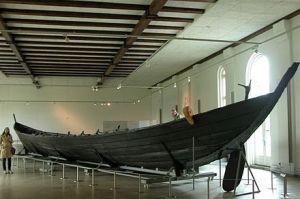As the dragon’s head emerges through the fog upon the prow of a fast moving ship, cutting the waters of a formidable sea, the denizens of the invaded land turn on their heels and run. Yet, they hardly have time to escape before the ship has landed and Viking men, bellowing war cries, have embarked upon their shore to raid, pillage and plunder, intent on returning home full of riches and glory.
Viking shipwrights living at the shores of mercurial waters fashioned the most technologically advanced works of art of their era in the form of expertly crafted ships that were used for a multitude of purposes ranging from spiritual rituals, cargo and hauling, merchant trading, and war. The earliest discovery of these ships, dating back to between 500 and 300 BCE neither had a sail nor was rowed by oarsmen; instead, it was propelled by paddles. By ACE 350,

The Nydam oak boat on display at Gottorf Castle, Schleswig, Germany. Wikipedia
ships, such as the Nydam vessel, were powered by oars; and by ACE 850, ships, such as the Gokstad vessel, were powered by both a square sail and a steering oar. These expertly crafted ships were not only prime examples of the shipwright’s creative and artistic abilities but their extensive knowledge of the waters which surrounded them, having been built to withstand the unforgiving conditions of the sea. The superlative ships of the Nordic tribes allowed men and women to voyage, discover and conquer many lands, expanding horizons of trade and leading to new settlements and civilizations carrying on a rich and dominant European culture.
Vessels made for travel and war were long and narrow for increased speed in the water, with more advanced designs having masts that could be lowered manually, so that oarsmen could take over hen more maneuverability was necessary, while cargo ships were tall and broad with a set mast. Although these ships differed greatly in appearance they were constructed in a similar manner, having been fashioned from tall oak trees, reaching up to ninety feet in length. Naturally curved pieces of oak were used for the keel of the ship which was meant to host the main weight of items taken and brought home on voyages. Thick strakes were then overlaid across the ribs of the vessel, fastened with iron rivets and tied down with spruce root cords for extra support and durability.
To “go-a-viking” was an integral part of Nordic life as young men sought to live honorably and die courageously, Furthermore, a social structure, which did not offer equal opportunity to all, often determined the role that one would fill in Viking society. Atop the social ladder stood the aristocracy, who owned large plots of land, and on the lowest rung sat the slaves, prisoners of war, and their progeny. In between were the free peasants who consisted of shipwrights, merchants and artisans among other. Those who stood to receive no inheritance from there progenitors were those most likely to set sail to foreign lands in search of fortune and fame, although it was requisite for the aristocrats to make such expeditions with their sons in order to broaden their following, strengthen their war band, and reign as chieftain.
Indeed, no man could ever be a king without performing the deeds he expected of his followers, as the Viking code of ethics demanded this of any potential leader. In this code know as “drengeskapur,” “Self-respect, honor, and reputation were necessary above all, and these could not exist without a firm foundation of loyalty to family and comrades.” (34) These virtues were earned in part by voyaging, exploring, and returning home as one who’d done good deeds and earned a good name. Unfortunately, achieving the status of a hero who’d done great deeds often dictated that kings died at an early age, but a good name meant eternal honor. Without the beautiful ships crafted by the free peasant shipwrights, none of this would have been possible; therefore, Viking culture depended wholeheartedly on the dexterity of the shipwright and the technological advances achieved through his unsurpassed knowledge of the ice cold waters that surrounded him.

Living in frigid conditions upon nearly barren lands that offered little in the way of agriculture, precious metas and other resources, to “go-a-viking” was a necessary aspect of life for Nordic tribes, although free peasant merchants also found a living through trade with foreign visitors and travel to distant lands. Merchant traders from Sweden ventured as far as China, returning home with fine silks probably procured in exchange for amber, a valuable item used in bartering during the Viking era in Europe. Vikings set their magnificent ships into the unpredictable waters and expanding routes from their Norwegian homelands through the continents of Europe and Asia, using trade of items such as amber and fur as well as sheer force on raids. Arabic silver and other precious metals were also acquired and became a new standard of currency in Northern Europe, where previously only cattle and proprietorship of land determined wealth. Discovering a lavish market in Western Europe called Dorestad which had its own mint for stamping silver deniers and Frisian pennies, Viking raiders took full advantage of their strength versus Dorestad’s weak defenses and sacked the town repeatedly, pillaging the precious metals and leaving dead and dying in their fiery wake.
The expertly crafted vessels of shipwrights with menacing dragon heads upon the prow and intricately carved knot work on the sides were used for more than Viking raids and merchant voyages, but also the discovery of new lands. Raudi the Red, a Norse hero, exiled from his Norwegian homelands for terror that he caused and all who opposed him, discovered Iceland when his mistakenly bumped into the unknown territory. Raudi the Red was clever enough to name his new home Iceland, despite its brilliant greenery, in order to keep other adventurers away, but eventually the populations would rise, farmlands would be occupied, and the place that Raudi had discovered for himself would become busy. Raudi the Red would eventually be exiled form Iceland as well for apparently sending henchmen to cause an avalanche that crushed a neighbor’s home in an attempt to steal their farmland. Viking influence has been found through Europe in places such as Britain, Italy, Sicily, Ireland and Scotland, as they had been tenacious and obstinate in the many faces of adversity, setting their ships to new lands.
Viking burials were extravagant and at times brutal occasions. The importance of custom and ritual in Viking culture is most evident in discoveries of burial mounds throughout Europe. One such mound discovered at Sutton Hoo in England “contains the remains of a wealthy and powerful Anglo-Saxon man, probably a seventh-century king” (145) in a ship ninety feet long and fourteen feet wide. The extravagant ship contained a cache of treasures inside a small house that had been erect amid the bow and stern of the vessel. The treasures ranged from a wooden harp and armor to silver and gold coins. On occasions when warriors were not buried with their ships they were set aflame and sent out to sea for one last voyage.
Burial ritual of the Run tribe were far more violent which is evidenced by discoveries made at burial mound thirteen in the pine forests of Gnezdovo, the resting place of a Viking chieftain and his servant woman. After adorning the ship and corpse with treasures, the young maidservant, who sought honor and eternal freedom by perishing in a bellicose ritual that called for her to be slain beside her dead master, appeared ready to sacrifice herself. Ibn Fadlan who observed the ritual wrote,
“The men beat with their staves on the shields so that her shrieks should not be heard, and other girls should not be frightened. They laid her by the side of her dead master, then two took her legs, two took her hands, and the old woman, who is called Angel of Death, put a rope round her neck and gave it to two men to pull; then she came with a dagger with a broad blade and began to thrust it time and again between the girl’s ribs, while the two men choked her with rope so that she died.” (70)
At this point the ship and the corpses were set ablaze and soon the flames would burn brilliantly, ensconcing them.
The vessels of the Viking shipwrights were used in every aspect of Viking culture and without them the Nordic way of life would have dwindled and died miserably before it was ever launched into waters. Instead, the use of these magnificent vessels allow for import/export of goods and other trade practices that still exist today. Furthermore, the Norse effectively created the world’s first mighty naval fleets. Without these ships, foreign lands would have remained unchartered and unsettled for unknown periods of time. The importance of Viking shipwrights and their ancient vessels can n9t be overstated, as they not only carried men and women to new lands but also tradition and a rich culture that was clearly a shaping force of the modern world, especially for Europe and North America.
Works Cited:
1993 Time-Life Books, U.S.A. Alexandria, Virginia. Lost Civilizations, Vikings: Raiders from the North. (34, 70)
2013 Pearson Education, Inc. U.S.A. Discovering the Humanities, Henry M. Sayre (145)








